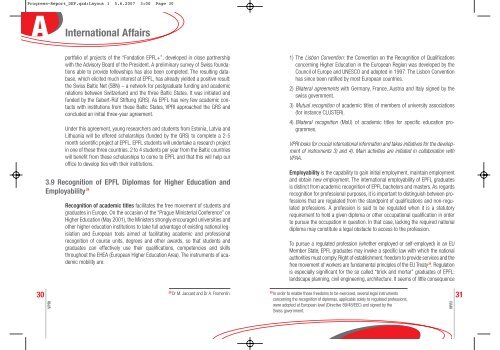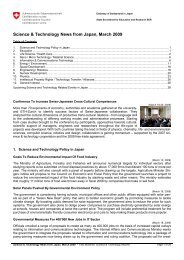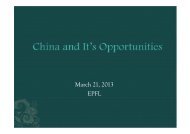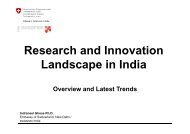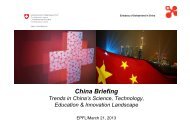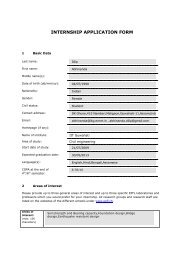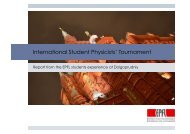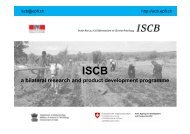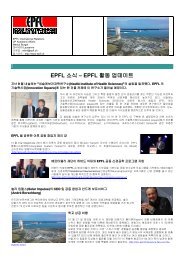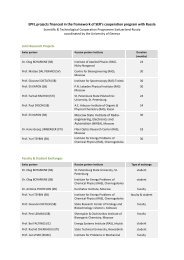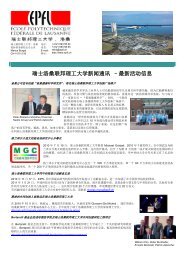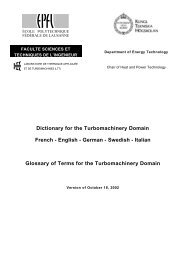International Affairs - Relations Internationales - EPFL
International Affairs - Relations Internationales - EPFL
International Affairs - Relations Internationales - EPFL
You also want an ePaper? Increase the reach of your titles
YUMPU automatically turns print PDFs into web optimized ePapers that Google loves.
Progress-Report_DEF.qxd:Layout 1 5.6.2007 3:00 Page 30<br />
A<br />
30<br />
VPRI<br />
<strong>International</strong> <strong>Affairs</strong><br />
portfolio of projects of the “Fondation <strong>EPFL</strong>+”, developed in close partnership<br />
with the Advisory Board of the President. A preliminary survey of Swiss foundations<br />
able to provide fellowships has also been completed. The resulting database,<br />
which elicited much interest at <strong>EPFL</strong>, has already yielded a positive result:<br />
the Swiss Baltic Net (SBN) – a network for postgraduate funding and academic<br />
relations between Switzerland and the three Baltic States. It was initiated and<br />
funded by the Gebert-Rüf Stiftung (GRS). As <strong>EPFL</strong> has very few academic contacts<br />
with institutions from these Baltic States, VPRI approached the GRS and<br />
concluded an initial three-year agreement.<br />
Under this agreement, young researchers and students from Estonia, Latvia and<br />
Lithuania will be offered scholarships (funded by the GRS) to complete a 2-5<br />
month scientific project at <strong>EPFL</strong>. <strong>EPFL</strong> students will undertake a research project<br />
in one of these three countries. 2 to 4 students per year from the Baltic countries<br />
will benefit from these scholarships to come to <strong>EPFL</strong> and that this will help our<br />
office to develop ties with their institutions.<br />
3.9 Recognition of <strong>EPFL</strong> Diplomas for Higher Education and<br />
Employability 29<br />
Recognition of academic titles facilitates the free movement of students and<br />
graduates in Europe. On the occasion of the “Prague Ministerial Conference” on<br />
Higher Education (May 2001), the Ministers strongly encouraged universities and<br />
other higher education institutions to take full advantage of existing national legislation<br />
and European tools aimed at facilitating academic and professional<br />
recognition of course units, degrees and other awards, so that students and<br />
graduates can effectively use their qualifications, competencies and skills<br />
throughout the EHEA (European Higher Education Area). The instruments of academic<br />
mobility are:<br />
29 Dr M. Jaccard and Dr A. Fromentin.<br />
1) The Lisbon Convention: the Convention on the Recognition of Qualifications<br />
concerning Higher Education in the European Region was developed by the<br />
Council of Europe and UNESCO and adopted in 1997. The Lisbon Convention<br />
has since been ratified by most European countries.<br />
2) Bilateral agreements with Germany, France, Austria and Italy signed by the<br />
swiss government.<br />
3) Mutual recognition of academic titles of members of university associations<br />
(for instance CLUSTER).<br />
4) Bilateral recognition (MoU) of academic titles for specific education programmes.<br />
VPRI looks for crucial international information and takes initiatives for the development<br />
of instruments 3) and 4). Main activities are initiated in collaboration with<br />
VPAA.<br />
Employability is the capability to gain initial employment, maintain employment<br />
and obtain new employment. The international employability of <strong>EPFL</strong> graduates<br />
is distinct from academic recognition of <strong>EPFL</strong> bachelors and masters. As regards<br />
recognition for professional purposes, it is important to distinguish between professions<br />
that are regulated from the standpoint of qualifications and non-regulated<br />
professions. A profession is said to be regulated when it is a statutory<br />
requirement to hold a given diploma or other occupational qualification in order<br />
to pursue the occupation in question. In that case, lacking the required national<br />
diploma may constitute a legal obstacle to access to the profession.<br />
To pursue a regulated profession (whether employed or self-employed) in an EU<br />
Member State, <strong>EPFL</strong> graduates may invoke a specific law with which the national<br />
authorities must comply. Right of establishment, freedom to provide services and the<br />
free movement of workers are fundamental principles of the EU Treaty 30 . Regulation<br />
is especially significant for the so called “brick and mortar” graduates of <strong>EPFL</strong>:<br />
landscape planning, civil engineering, architecture. It seems of little consequence<br />
30 In order to enable these freedoms to be exercised, several legal instruments<br />
concerning the recognition of diplomas, applicable solely to regulated professions,<br />
were adopted at European level (Directive 89/48/EEC) and signed by the<br />
Swiss government.<br />
VPRI<br />
31


